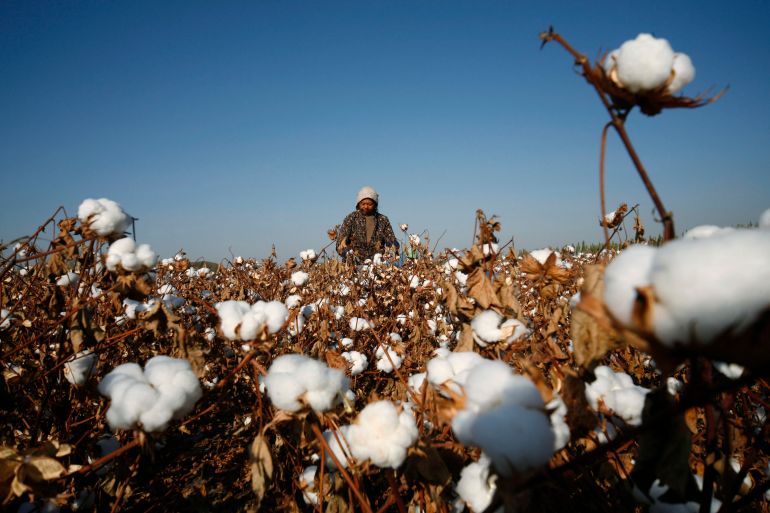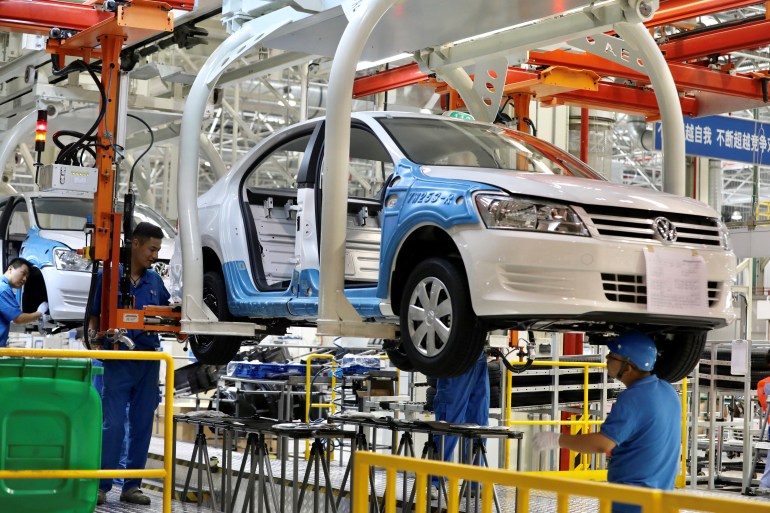UN report on Xinjiang ups pressure on brands from Nike to Airbnb
Landmark OHCHR report calls on businesses to take ‘all possible measures’ to respect human rights.

Kuala Lumpur, Malaysia – A United Nations assessment that China’s treatment of Uighurs may amount to “crimes against humanity” is the latest damning report to raise pressure on multinationals like Nike and Tesla to rethink their operations in Xinjiang.
In a long-awaited 45-page report released on Thursday, the UN High Commissioner for Human Rights (OHCHR) called on businesses in China’s far-western region to take “all possible measures” to respect human rights, including through “enhanced human rights due diligence”.
Keep reading
list of 4 itemsHong Kong’s ‘yellow’ companies see persecution in COVID crackdown
Potential ‘crimes against humanity’ in China’s Xinjiang, UN says
‘Grief and memory’: Challenging Malaysia’s historical narratives
The OHCHR report, released on the last day of rights chief Michelle Bachelet’s term, made particular mention of companies involved in security and surveillance, recommending a strengthened “human rights risk assessment” for the sector. China’s Permanent Mission to the UN rejected the report as “disinformation” and “lies fabricated by anti-China forces and out of presumption of guilt”.
The UN’s damning assessment comes after Tomoya Obokata, the UN special rapporteur on slavery, said earlier this month that it was “reasonable to conclude” that forced labour was taking place in the region.
Justine Nolan, an expert on the intersection between business and human rights at the University of New South Wales, said the report meant it was “no longer possible for any state, business or individual to have plausible deniability about the wide-ranging human rights abuses that have, and are continuing to occur, in Xinjiang.”
“This poses a challenge for many companies who are continuing to source products from Xinjiang,” Nolan told Al Jazeera, adding that firms should assume their “supply chains are tainted with modern slavery and should not be sourcing from the region unless they can disprove this”.
“Pulling out of a region or factory should always be a last resort but if it is simply impossible to independently verify working conditions in your production facilities, then based on this report a company should assume there are ongoing human rights abuses based on production coming out of Xinjiang.”
Legal and reputational risks
Major international companies, including household brands such as Nike, Airbnb, Tesla, Siemens and Volkswagen, have faced blowback from rights groups and Western governments in recent years for doing business in Xinjiang, a major producer of the global supply of cotton and polysilicon, the key raw material for solar panels.
A 2020 report by the Australian Strategic Policy Institute, a Canberra-based think-tank, identified 82 international brands as benefitting from Uighur labour.
In June, United States customs authorities started enforcing the Uyghur Forced Labour Prevention Act, which bans the import of goods from Xinjiang unless it can be proved that they were not produced using forced labour.
Despite the sweeping scope of the legislation, which some multinational companies and business groups opposed on the grounds that it would upend supply chains, US officials have indicated that enforcement will be initially focused on four high-risk sectors – apparel, cotton, tomatoes and polysilicon – as well as shipments coming directly from Xinjiang and companies sanctioned for using forced labour.
“China continues to dominate the global production of garments and textiles, and so the supply chains of many global brands have been marred by associations with Chinese forced labour,” said Nolan, the UNSW expert.
“This is a problem not only for brands with direct production connections to factories or fields in Xinjiang.”
Julien Chaisse, an expert in investment and trade at City University of Hong Kong, said he expected further “decoupling and isolation” between China and Western countries.
“Although many countries had started as early as 2018 to request their companies to perform tighter due diligence on the risks of doing business in Xinjiang, the UN report is likely going to require these countries to review and further tighten the due diligence obligations,” Chaisse told Al Jazeera.
“Practically, it means from a pure business angle that companies sourcing directly – or even indirectly – from Xinjiang or engaging in the Xinjiang market will be scrutinised even more than before; they will be exposed to legal and reputational risks in their countries of origin.”

Besides targeting imports tainted by forced labour, the US and other Western nations have in recent years also sanctioned dozens of Chinese firms, many of them tech companies such as Hikvision and Dahua that produce surveillance technology, for their alleged complicity in human rights violations in Xinjiang.
Charles Rollet, an analyst at surveillance research group IPVM, said that while the UN assessment might make some multinational companies think twice about starting operations in Xinjiang, it would have little effect on Chinese tech firms already working in the region.
“China is not like the US where some companies or CEOs actively criticise certain government policies,” Rollet told Al Jazeera. “This risks arrest, retaliation against the company, or both. People’s Republic of China tech and surveillance firms are heavily involved in government surveillance already, so they have no real qualms with Xinjiang.”
While global brands such as Nike have pledged to beef up their auditing procedures against forced labour, international firms have nonetheless shown an appetite for maintaining and even expanding operations in the region.
In January, Tesla, the Texas-based electric carmaker, came under fire from US lawmakers and rights activists when it announced the opening of a new showroom in Xinjiang.
In June, Volkswagen’s outgoing China CEO Stephan Wollenstein said the company planned to keep making cars in the region and was open to a visit by a company-nominated human rights specialist to its plant in the capital, Urumqi.
The German auto giant has repeatedly said that its operations do not rely on forced labour and insisted its presence in Xinjiang has a “positive impact”.
In a statement to Al Jazeera, Volkswagen said it was “seriously concerned” about the latest UN report but it had processes in place to protect human rights.
“It is a fact of life that plants cannot be built or closed down overnight. Investments have a decades-long horizon. Furthermore, the impact on employees at a plant must be taken into consideration. That also applies to the joint venture plant in Urumqi,” a spokesperson said.
“Moreover, all employees at the joint venture plant in Urumqi are employed directly by SAIC Volkswagen. We found no evidence that SAIC Volkswagen employees are forced to work there. Employees are hired on the basis of their skills – irrespective of age, religious beliefs or ethnic origin. To make it clear: We strictly oppose any form of forced labor in all our business operations.”
Nike, Airbnb, Tesla, and Siemens were contacted for comment.
While coming under pressure for operating in Xinjiang, international brands that do acknowledge concerns about alleged human rights violations risk invoking the wrath of Chinese nationalists.
Last year, Nike and fashion retailer H&M faced boycotts by consumers, e-commerce sites and celebrities in China after expressing concerns about allegations of forced labour in their supply chains.
A Hong Kong-based trade lawyer, who requested anonymity due to the sensitivity of the situation, said firms operating in Xinjiang were in a bind.
“The UN report is likely to place additional pressure on companies like Tesla and Airbnb who have already received negative publicity for their operations in Xinjiang,” the lawyer said.
“I would suspect that whatever remaining companies are in Xinjiang will consider this report, and balance the ESG/reputational risks for continuing to do business there with backlash from Chinese government and the Chinese public for appearing discriminatory against China.”
This article has been updated with a statement from Volkswagen